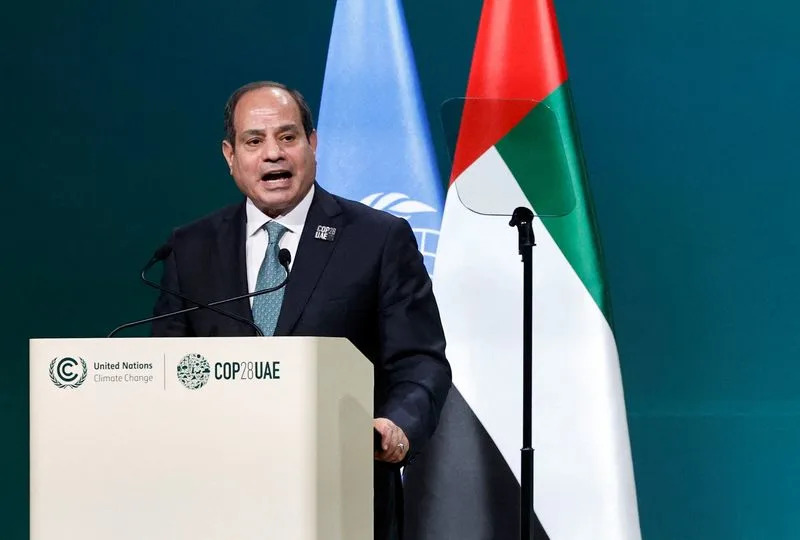Egypt is seeking to reach a deal for a ceasefire in Gaza, increase entry of aid and to allow displaced people in the south of the enclave to move to the north, President Abdel Fattah al-Sisi said on Friday.
Sisi also warned against the danger of an Israeli incursion into the city of Rafah, where an estimated 1.5 million people have sought shelter next to Gaza's border with Egypt.
Aid officials have warned of looming famine in the coastal enclave.
"We are talking about reaching a ceasefire in Gaza, meaning a truce, providing the biggest quantity of aid," Sisi said in a message recorded during a visit to a military academy.
This would include "curbing the impact of this famine on people, and also allowing for the people in the centre and the south to move towards the north, with a very strong warning against incursion into Rafah", he said.
"We warned of what is happening, that aid not entering would lead to famine," Sisi said.
Egypt, which fears the displacement of Palestinians crowded near its border, has been trying, along with Qatar and the United States, to mediate between Israel and Hamas to reach an agreement for a ceasefire and the release of Israeli hostages in return for Palestinian prisoners.
On Thursday, Egypt's foreign minister called on Israel to open land crossings with Gaza to let in more aid.
Egypt calls on Israel to open land crossings for Gaza aid
Egypt's foreign minister called on Israel on Thursday to open its land crossings to let more aid into the Gaza Strip and said Egypt was continuing efforts to agree a ceasefire between Israel and Hamas and a hostage-prisoner exchange.
Humanitarian relief has so far mainly been channelled through the Rafah crossing between Egypt and Gaza and the nearby, Israeli-controlled crossing of Kerem Shalom, but aid officials say the quantity delivered is far less than needed.
Egypt's military has recently taken part in air drops of aid into Gaza as the humanitarian situation in the Palestinian enclave has deteriorated.
Aid officials, however, say land transport is the only effective way of scaling up deliveries to meet needs quickly. Much of the aid provided by international donors has been stockpiled at Al Arish in the north of Egypt's Sinai Peninsula.
"Israel controls six other crossings that it should open," Egyptian Foreign Minister Sameh Shoukry told a press conference during a visit by his Spanish counterpart to Cairo.
"There is a long line of trucks waiting to enter but are subject to the procedures of vetting that must be complied to so that the trucks can enter safely, that the drivers are not targeted, that they are received on the other side," Shoukry said.
"We have the capacity to increase the number of trucks but the authorisation has to come," he added.
Egypt, which fears the displacement of Palestinians crowded near its border with Gaza, has previously said Israel was blocking aid. Aid officials say their inability to distribute aid within Gaza because of Israel's military campaign is a major impediment.
Israel denies obstructing aid deliveries into Gaza. It has blamed failures by aid agencies for delays and has accused the Islamist group Hamas of diverting aid. Hamas denies this and says Israel uses hunger as a weapon in its military offensive.
Gaza health authorities say more than 31,000 Palestinians have been killed since Israel launched its offensive in response to an Oct. 7 attack by Hamas which left some 1,200 people dead and at least 250 hostages captured.
Egypt alongside Qatar has been trying to mediate between Israel and Hamas to reach an agreement for a ceasefire and the release of Israeli hostages in return for Palestinian prisoners.
Attempts to strike a deal ahead of the start of the Muslim holy month of Ramadan this week fell through.
"We are working to reach a ceasefire, and release hostages and Palestinian prisoners," Shoukry said, declining to give further details.
Spanish Foreign Minister Jose Manuel Albares said Spain had the backing of more than 90 countries for an international peace conference to deliver a two-state solution for the conflict between Israel and the Palestinians.
5 Palestinians killed after shelling at UN aid distribution center in Rafah, Gaza
Five Palestinians were killed on Wednesday at the U.N. aid distribution center in Rafah, the southern Gaza city bordering Egypt, the Hamas-run Gaza Ministry of Health said. This distribution center is run by United Nations Relief and Works Agency (UNWRA), the main U.N. agency operating inside of Gaza.
The Gaza Ministry of Health said the U.N. distribution center was hit by shelling. ABC News has reached out to the Israel Defense Forces for comment on the attack.
Philippe Lazzarini, the Commissioner-General of the UNWRA, called for an "independent inquiry" into violations against the Israeli military’s targeting of U.N. sites in Gaza.
"Every day, we share the coordinates of all our facilities across the Gaza Strip with parties to the conflict. The Israeli Army received the coordinates including of this facility yesterday," Lazzarini said in a post on X (formally known as Twitter) after the attack.
"The UN, its personnel, premises and assets must be protected at all times. Since this war began, attacks against UN facilities, convoys and personnel have become commonplace in blatant disregard to international humanitarian law," he added. "I am calling once again for an independent inquiry into these violations and the need for accountability."
Aid agencies estimate there are now 1.4 million people, or two-thirds of Gaza's total population, displaced in this small town that borders Egypt. All are competing for the scant resources available amid the Israel-Hamas war.
Israel wants Rafah civilians to go to Gaza's center ahead of southern offensive
Israel plans to tell 1.4 million Palestinians displaced in the southern city of Rafah to seek shelter in central Gaza ahead of a planned Israeli offensive into the south. Israel’s chief military spokesman said Wednesday that civilians would be directed toward “humanitarian islands” with temporary housing, food, water and other necessities. He did not say when the evacuation would occur, nor when the Rafah offensive might begin. Humanitarian groups fear an offensive into an area densely crowded with so many displaced people would be a catastrophe. Rafah is also Gaza’s main entry point for desperately needed aid. Israel says Hamas maintains four battalions in Rafah that it wants to destroy.



